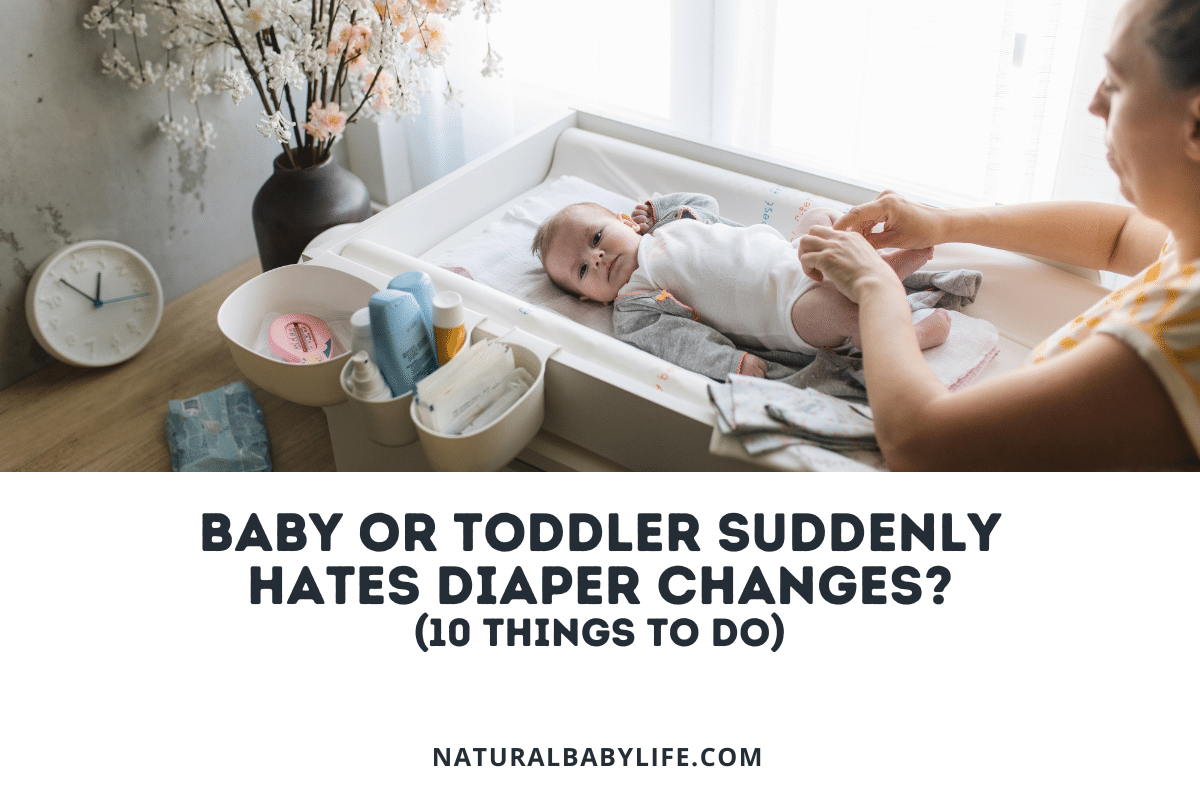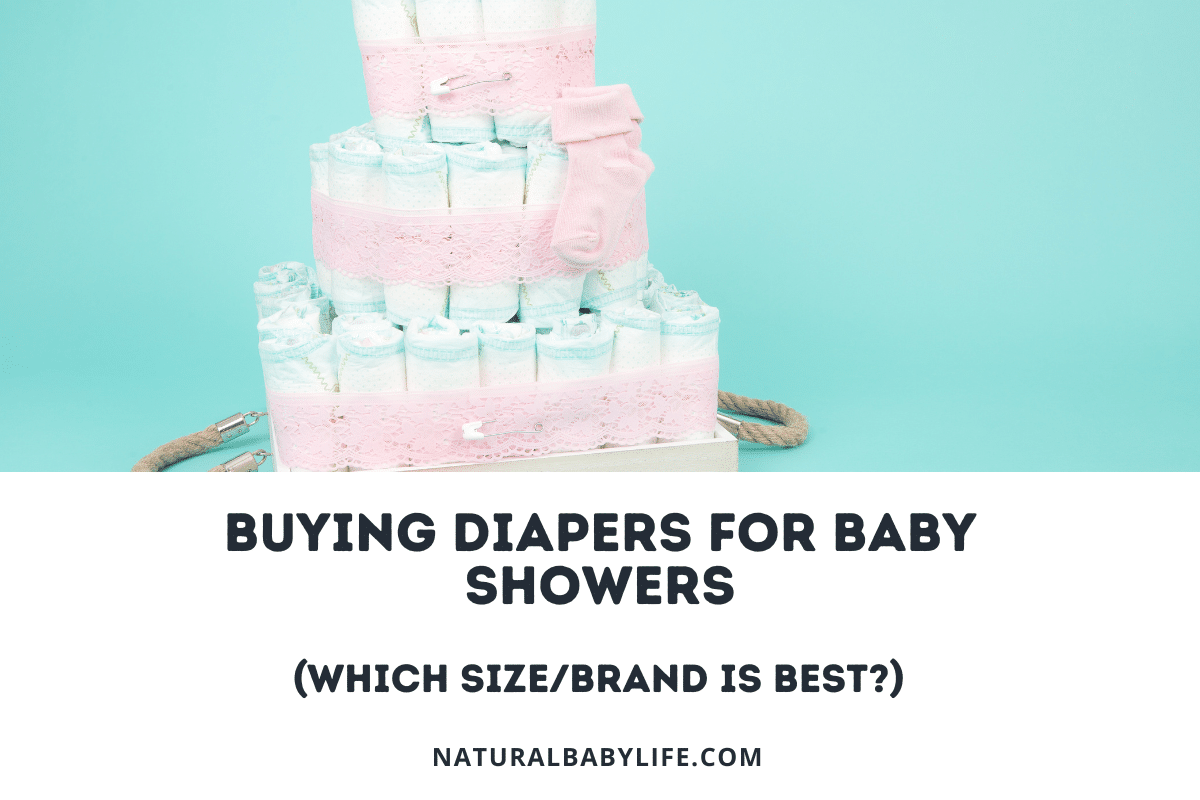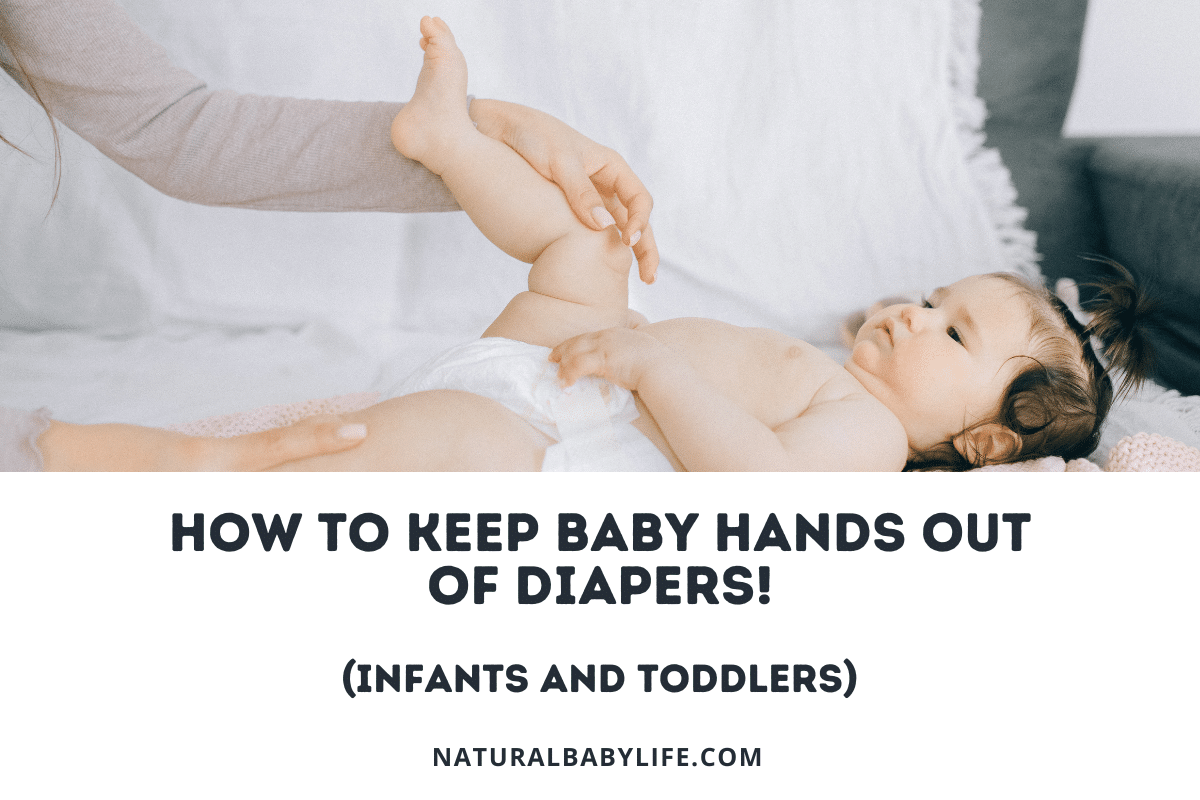Changing diapers is often a parent’s least favorite job. It can be difficult enough with a squirming baby, but when your baby grows into a mobile and “independent” toddler, the challenge seems to increase exponentially. You may not know what to do if your baby or toddler suddenly hates diaper changes.
Babies or toddlers could suddenly hate diaper changes because they crave independence and control of their bodies and environment. Parents can make diaper changes easier by finding ways to give their little one more independence, trying not to interrupt activities, and avoiding issues like diaper rash.
If your baby or toddler suddenly hates diaper changes, keep reading to discover why and how you can give them some of the control they crave.
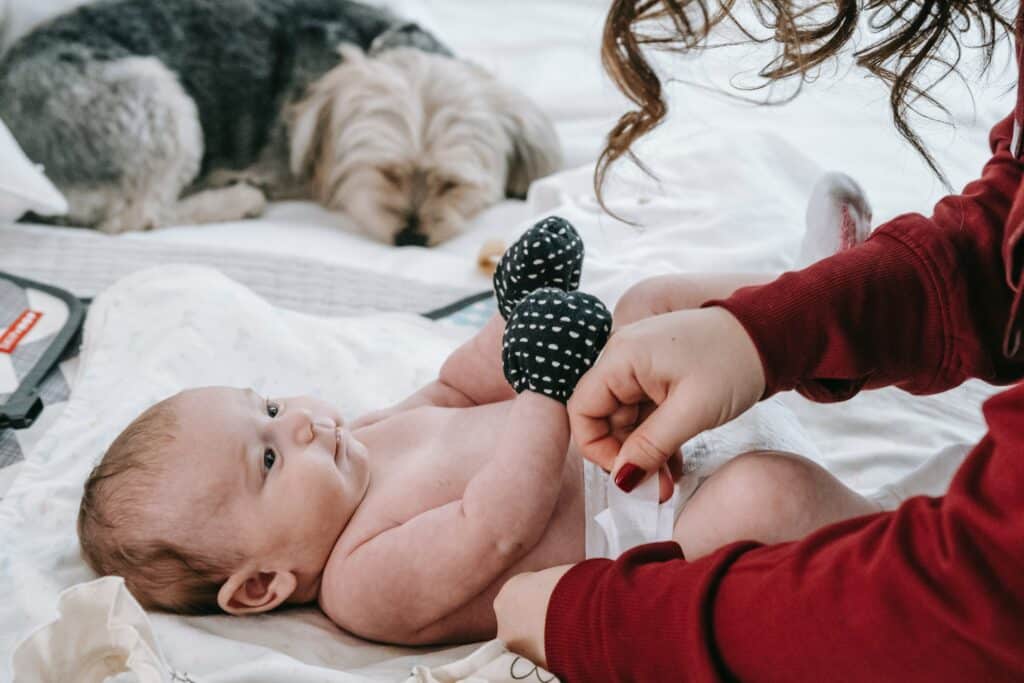
Table of Contents
Why does my toddler suddenly hate diaper changes?
It’s no surprise to most parents that toddlers want to be in control. However, it’s not always easy to determine what your toddler is trying to control at any given moment since their behavior may change without warning. A toddler may be fine with diaper changes one day but start running away, hiding, screaming, and fighting diaper changes the next. As a parent, you’re probably wondering where this behavior comes from and what your child is trying to tell you.
Why does my baby suddenly hate diaper changes?
At a young age, some babies may not like diaper changes, but they aren’t able to move around much while you’re changing their diaper. Once they start to become more mobile, your baby may roll over or try to get away from you during a diaper change. When this behavior comes out of nowhere it can be frustrating for parents, especially when their baby has an extremely messy diaper!
My 1 year old suddenly hates diaper changes
Around their first birthday, babies become more mobile. They may be crawling or sometimes walking at this point, which means they don’t stay still for long. If your 1 year old hates diaper changes, it may be because they don’t want to lay still while you change their diaper.
My 2 year old suddenly hates diaper changes
At 2 years old, your toddler is starting to reach many new developmental milestones, like running and stringing words together. 2-year-olds are also notorious for saying “no” and being a bit defiant as they start to become more independent. That being said, if your 2-year-old suddenly fights diaper changes, it’s likely due to their desire to do everything themselves.
As challenging as this is, it’s a sign that your child is learning about themselves and the world around them. It’s going to require a lot of patience on your end to calmly help your child navigate this phase.
Here are a few possible reasons for why your baby or toddler suddenly hates diaper changes:
Why your toddler suddenly hates diaper changes
As challenging as it is to change the diaper of a toddler who won’t stay still, in most cases, it’s a sign that they’re learning about themselves and the world around them. This sometimes comes out in the form of defiance, and it’s going to require a lot of patience on your end to calmly help your child navigate this phase. Here are a few possible reasons for why your baby or toddler suddenly hates diaper changes:
“It hurts!”
If your child has a rash, or something less obvious like a UTI, diaper changes may be painful. Fear of pain may cause your baby or toddler to run away, squirm, or scream during diaper changes. Of course, proper cleaning, more frequent diaper changes, and application of treatment products is the only way to heal and prevent these problems, but your little one isn’t old enough to understand that.
Even if the rash or infection has cleared up, the memory of pain may cause your child to have a continued aversion to getting their diaper changed. Toddlers sometimes need a few days to become used to diaper changes and realize they aren’t causing pain anymore.
If the diaper cream you have doesn’t seem to be working or you’re looking for a natural product that does a fantastic job, I always recommend this diaper cream here.
“I’m busy doing something else right now.”
When you smell a stinky diaper, you immediately know it’s time for a change. If your child is prone to diaper rash, you don’t want to wait. However, your child may not be ready for a diaper change at that moment.
Toddlers often have difficulty with transitions. If your child is engaged in a certain activity, they may react poorly if you interrupt them. It may be playing with a toy, watching a favorite show, or even something silly like spinning in circles or staring at the ceiling fan.
Whatever your child is focused on at that moment may be more important to them than getting their diaper changed.
“I’m bored/tired/hungry/thirsty.”
Diaper changes can be very boring for an active toddler. Even though we’re only asking them to lay still for a minute or two, those two minutes may seem like an eternity for a child with a lot of energy. They may squirm around to find something to do or decide to get up and leave mid-change.
Other needs, such as hunger, thirst, or fatigue, may also be more pressing to your toddler at the time you decide to change them. Toddlers are unlikely to know or care when their diaper is wet, but they will quickly let you know if they need something else and their diaper change is keeping them from getting what they want.
“I don’t want my clothes off.” or “I don’t want to wear that.”
Some children may have an issue with you removing their clothes. It could be because they’re cold or they really like the outfit they’re in and don’t want to take it off. It could also be an issue of vulnerability since they become more self-conscious with age, or an issue with control because they want to decide when and where they get undressed.
On the other hand, some children become upset during the redressing process. It could be because their diaper was too tight or the pants they had on were itchy or hot and they don’t want to put them back on. Sometimes, toddlers also just want to run around naked and they will resist any direction otherwise!
“I want to do it by myself.”
Toddlers have a strong desire to be independent. Even when a task is beyond their ability to handle, they want to try. Lying down for a diaper change doesn’t allow the child to take part in the activity since they can’t see what you’re doing or try to do it themselves.
Your child might want to help with removing and putting on clothes or stand up so they can see what’s going on. At some point, they may begin to show interest in potty training and the extra level of independence that comes with it.

What to do when your baby or toddler suddenly hates diaper changes
There are many reasons why your toddler may be resisting diaper changes, but they all point to a desire for independence and control. Once you figure out why your child is resisting, you can take steps to make things easier on yourself and your child. Here are some tips to help you get started.
Check for rashes and other problems
If your child is hurting, diaper changes won’t be easy. Rashes are easy to spot but be mindful of other problems like yeast infections or UTIs which may not be accompanied by a rash.
If your baby suddenly hates diaper changes and seems to be in pain, watch for other symptoms of a UTI such as fever or foul-smelling urine. Yeast infections usually cause rashes, but you can also look for white spots or a discharge with an odor.
If your child is showing any of these symptoms, talk to your pediatrician about treatment options. Once the problem has cleared up, you should have a much easier time with diaper changes.
Wait and give warning
If your child is engaged in an activity, you may need to wait a little bit before changing them. Let your little one finish what they’re doing and try to change their diaper between activities. If they are watching television, consider simply bringing a changing pad to them so you don’t have to interrupt at all.
If you’re worried their play will go on too long, leading to a leak or a rash, try giving your child a warning. “In three minutes we are going to change your diaper.” Keep in mind that toddlers have a poor understanding of time. A visual timer may help them mentally prepare to pause their activity and let you change them.
Meet other needs first
Adults like to do things in an order that makes sense. When your child first wakes up you may want to change their diaper first, then have breakfast and a drink. However, your sleepy toddler may have other ideas. Consider putting the diaper change on hold and taking some time for extra snuggles and a small drink or snack.
If the diaper change can’t wait, talk to your child about the order you plan to do things in. “First diaper, then food.” You can play up this conversation by talking about what you are going to eat. This lets your toddler know you’re listening and their other needs will be met shortly.
Provide distractions
For the easily bored toddler, have a few things on hand to keep them entertained during diaper changes. Toddlers have fun with even simple things like the wipes package – just be sure to take out what you need first. You could also provide small books or toys reserved only for diaper time.
Make sure whatever you provide is easily sterilized since it may become contaminated during diaper changes. Also, be sure to change out the toys regularly to keep things interesting.
Live entertainment
If toys or books don’t work out, you can try singing songs or telling a funny story while you change your child’s diaper. Include silly faces and noises to help keep their focus on you, instead of trying to getaway.
Don’t like singing or telling stories? Play a favorite song or video on your phone instead. Keep in mind that the same thing won’t work every time, so change things up and be creative. The important thing is to keep your child engaged.
Let them help
Toddlers love to help out around the house and do whatever their parents are doing. Diaper changes are no different. To keep them from fighting a diaper change, give them a job to do. You might keep diapers and wipes in a place they can reach and then ask them to get what you need for a diaper change.
When you’re finished, your child might love to help throw the diaper away.
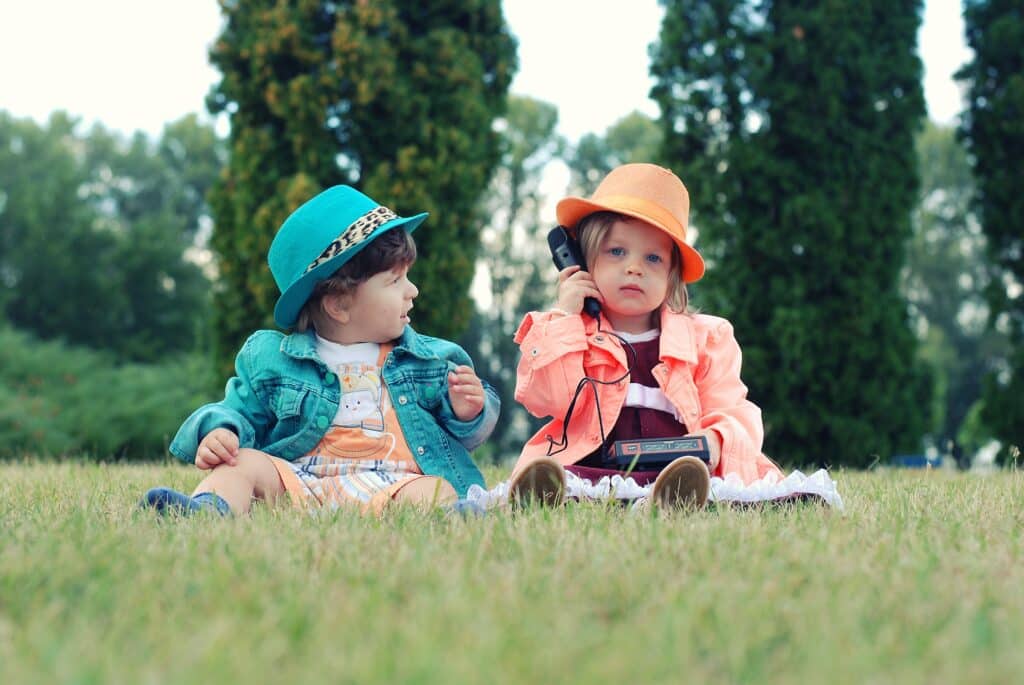
Let them choose their clothes
Your child probably doesn’t have a well-developed sense of style yet, but toddlers frequently know what they like and don’t like. Look for signs that your child is uncomfortable in what they are wearing – especially if they fight redressing after a diaper change. Consider the material and the temperature to help your child feel more comfortable.
Even if you don’t want your child to have free access to all of their clothes, you may want to give them a few options to choose from. The same goes for diapers – have a few different styles on hand or let them pick the character design next time you’re diaper shopping. Offering these choices gives your child a feeling of control.
Provide privacy
As toddlers become more self-aware, they may feel the need to have privacy during diaper changes. It is important to respect and accommodate that need. Give your child a choice of where they would like to have their diaper changed. Also, allow them the choice of closing the door. These choices will help them feel more independent and in control.
Consider, also, that a desire for privacy may be a sign that your child is ready to begin potty training. Start looking into potty training methods and watch for other signs that your child is ready.
Consider switching to training pants
Even if your child is not ready for potty training yet, switching to disposable training pants may help give them the independence they desire. Using training pants allows your child to stand up during most changes and watch what you are doing.
Training pants are easier to get on and off, making diaper changes a lot faster. Your toddler can start helping to pull up their training pants when they are done. They will gain independence and start learning the dressing skills they will need when they do start potty training.
Start potty training!
If your child is showing most of the signs that they’re ready, go ahead and start potty training. This is a big step in independence for your child and there are many methods for potty training out there. I recommend Child-Oriented Potty Training which gives the child control over how quickly they move through the steps.
Tips for easier diaper changes
If every diaper change is a nightmare, you may be desperate for something that works. Aside from what we already discussed, if your baby suddenly hates diaper changes, here are some simple tips for making diaper changes easier for everyone:
- Get your supplies ready- If you know diaper changes are going to be a struggle, make it easier by having the diapers and wipes ready to go. This will allow you to be as efficient as possible.
- Ask for help- In my experience, when you have a strong toddler and a messy diaper, you might need an extra set of hands. Don’t hesitate to ask your partner to help you if necessary.
- Go with the flow- The more your toddler feels in control, the easier it will be. They can’t decide they don’t want a diaper change, but they can decide where they want it changed or even what they’re wearing. Try to avoid a power struggle with your child if you can.
- Switch it up- Even though you may be used to the spot you use for diaper changes, if you can change it up, your baby or toddler may be more likely to comply. Find a spot they like for easier diaper changes.
- Keep it positive- Trying to wrangle an angry toddler or baby during diaper changes can be frustrating. But if you’re upset at your little one, they’re even more likely to dislike being changed. Keep things positive as much as possible, even when your child is upset.
FAQS
Why does my 1 year old hate diaper changes?
Around their first birthday, babies become more mobile. They may be crawling and sometimes walking at this point, which means they don’t stay still for long. If your 1 year old hates diaper changes, it may be because they don’t want to lay still while you change their diaper.
Could my baby’s screaming during diaper changes be a medical concern?
If your baby suddenly hates diaper changes, it could be related to an issue like diaper rash or a UTI. If you baby or toddler has any other symptoms, call their pediatrician. Even if they don’t have symptoms of a UTI but you think something may be wrong, trust your gut and make an appointment with the doctor.
When do newborns stop crying during diaper changes?
Even from a young age, some babies hate diaper changes. When newborn babies seem to despise diaper changes, it’s usually because they’re cold. Newborns can’t regulate their own body temperature, so they tend to get cold easily. Try to keep them dressed as long as possible, and you can use a wipe warmer to keep your baby warm during changes.

